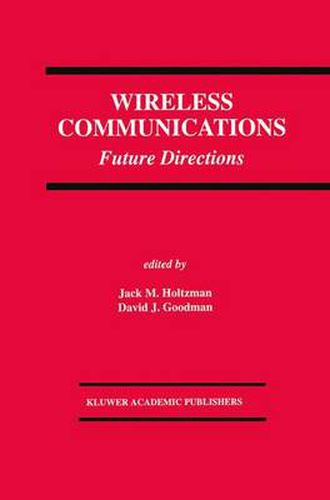Readings Newsletter
Become a Readings Member to make your shopping experience even easier.
Sign in or sign up for free!
You’re not far away from qualifying for FREE standard shipping within Australia
You’ve qualified for FREE standard shipping within Australia
The cart is loading…






This title is printed to order. This book may have been self-published. If so, we cannot guarantee the quality of the content. In the main most books will have gone through the editing process however some may not. We therefore suggest that you be aware of this before ordering this book. If in doubt check either the author or publisher’s details as we are unable to accept any returns unless they are faulty. Please contact us if you have any questions.
The past several years have been exciting for wireless communications. The public appetite for new services and equipment continues to grow. The Second Generation systems that have absorbed our attention during recent years will soon be commercial realities. In addition to these standard systems, we see an explosion of technical alternatives for meeting the demand for wireless communications. The debates about competing solutions to the same problem are a sign of the scientific and technical immaturity of our field. Here we have an application in search of technology rather than the reverse. This is a rare event in the information business. Happily, there is a growing awareness that we can act now to prevent the technology shortage from becoming more acute at the end of this decade. By then, market size and user expectations will surpass the capabilities of today’s emerging systems. Third Generation Wireless Information Networks will place even greater burdens on technology than their ancestors. To discuss these issues, Rutgers University WINLAB plays host to a series of Workshops on Third Generation Wireless Information Networks. The first one, in 1989, had the flavor of a gathering of committed enthusiasts of an interesting niche of telephony. Presentations and discussions centered on the problems of existing cellular systems and technical alternatives to alleviating them. Although the more distant future was the announced theme of the Workshop, it drew only a fraction of our attention.
$9.00 standard shipping within Australia
FREE standard shipping within Australia for orders over $100.00
Express & International shipping calculated at checkout
This title is printed to order. This book may have been self-published. If so, we cannot guarantee the quality of the content. In the main most books will have gone through the editing process however some may not. We therefore suggest that you be aware of this before ordering this book. If in doubt check either the author or publisher’s details as we are unable to accept any returns unless they are faulty. Please contact us if you have any questions.
The past several years have been exciting for wireless communications. The public appetite for new services and equipment continues to grow. The Second Generation systems that have absorbed our attention during recent years will soon be commercial realities. In addition to these standard systems, we see an explosion of technical alternatives for meeting the demand for wireless communications. The debates about competing solutions to the same problem are a sign of the scientific and technical immaturity of our field. Here we have an application in search of technology rather than the reverse. This is a rare event in the information business. Happily, there is a growing awareness that we can act now to prevent the technology shortage from becoming more acute at the end of this decade. By then, market size and user expectations will surpass the capabilities of today’s emerging systems. Third Generation Wireless Information Networks will place even greater burdens on technology than their ancestors. To discuss these issues, Rutgers University WINLAB plays host to a series of Workshops on Third Generation Wireless Information Networks. The first one, in 1989, had the flavor of a gathering of committed enthusiasts of an interesting niche of telephony. Presentations and discussions centered on the problems of existing cellular systems and technical alternatives to alleviating them. Although the more distant future was the announced theme of the Workshop, it drew only a fraction of our attention.